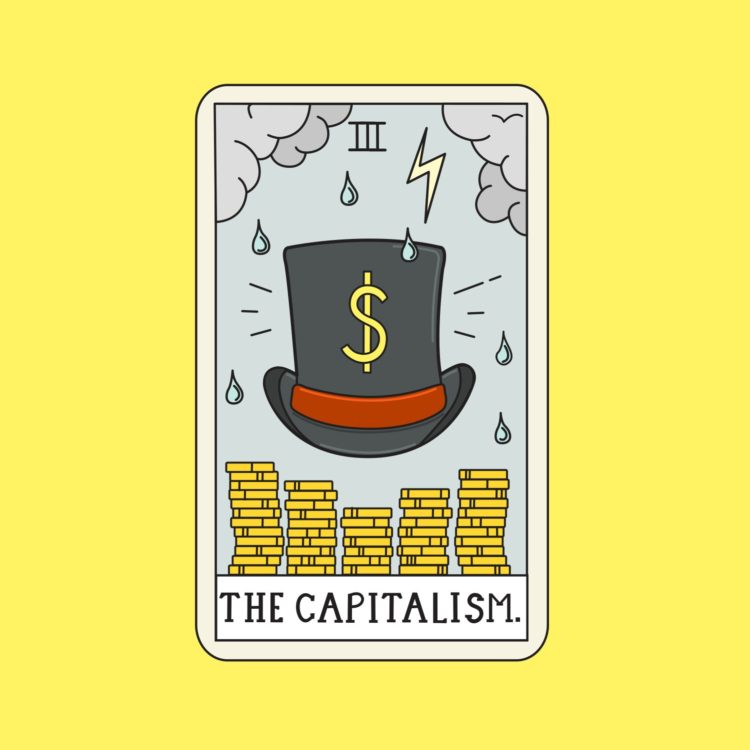“Capitalism robs you of your Divinity.”
Nap Ministry founder Tricia Hersey articulates these words on her platform’s Instagram Live video, referring to the importance of rest and how grind culture is detrimental to business owners who live by its code. For those unfamiliar with the term, grind culture (also known as hustle culture) is the idea that entrepreneurs will only obtain their interpretation of success by being on and continuously available, never resting but always hustling even after becoming established. This mentality—and the behavior it encourages—is extremely evident on social media platforms like Instagram, where young BIPOC entrepreneurs plaster on their business accounts vibrant photos captioned with short essays about how their latest business venture rewarded them a lofty apartment or a week-long vacation to the Bahamas. Though there’s nothing wrong with possessing a strong work ethic, the internet does play a significant role in glorifying productivity porn disguised as harmless inspiration for BIPOC people.
Grind culture is a potential death wish for BIPOC entrepreneurs like myself, a childhood trauma survivor (CTS) who is easily swayed by any example of accomplishment that encourages me to labor through hunger and sleep deprivation. I tell myself the finished product will raise the consciousness of fellow CTSs who wish to break generational and historical trauma curses through inner child-centered storytelling. That I’m serving my divine purpose by teaching them about the inner child archetypes we’ve adopted to survive dysfunctional environments. That writing until my shoulder trembles and swells from lack of mobility, until blurriness and fatigue hinders my ability to read my own handwriting, is well worth it if I’m eventually influencing other CTSs on an international scale. Besides, I consider myself healed enough to finally share stories about how I’ve overcome the bulk of my childhood trauma to rediscover my destiny—while gaining monetary abundance doing so.
Or so I thought.
Unfortunately, I became trapped in a perpetual rotation of workaholism that not only disconnected me from my divinity but replaced it with the trepidation about not being acknowledged for my efforts. The impending thoughts of my erasure from history, of not leaving behind a respectable legacy often led me to produce above and beyond my capacity, to shove from my consciousness the guilt and indications of laziness when my body craved recuperation. However, a near-emotional breakdown and my ancestors’ stern, but loving demands to focus primarily on my recovery forced me to conclude that I, like many BIPOC spiritual entrepreneurs with unaddressed childhood trauma, unknowingly reenacted through excessive productivity subconscious narratives regarding negative perceptions of my own worthiness, compromising my relationship with my spiritual support system.
To understand the devastating nature of grind culture, we must comprehend the toxicity of its foundation—internalized capitalism. Anders Hayden, a political science professor at Dalhouse University, defines internalized capitalism as “this idea that our self-worth is directly linked to our productivity.” Supported by the capitalist system, this ideology coerces BIPOC spiritual entrepreneurs/CTSs into believing that complete dedication to our career will ultimately reward us with prosperity and deserved recognition. Our aspirations towards success are further compounded by the genuine desire to fulfill our divine purpose and by messages received from Spirit (commonly through divination) regarding potential abundance that will sever our ancestry’s ties with generational poverty. This combination of factors emboldens us BIPOC spiritual entrepreneurs to utilize our gifts and trauma testimonies to elevate the collective consciousness of those we serve.
BIPOC spiritual entrepreneurs who consistently do shadow work centering childhood trauma and its connection with productivity will more likely recognize the dangers of grind culture and the capitalist system that birthed it. The coping strategies they’ve instituted permits them to separate their self-worth from productivity by honoring their self-preservation through essential rest. But this isn’t normally the case for the wounded warriors struggling with internalized capitalism (the group I myself fall into), who neither initiated the recovery journey nor plunged deeply enough to be cognizant of reoccurring themes correlating production with their lack of self-worth. The latter sabotages personal and spiritual development in attempts to prove our worthiness by increasing our already strenuous workload. We post new content crafted during three nights of insomnia, host live videos to connect with clients on empty stomachs. Or upload vivid images of Tarot cards complimented with detailed Spirit-led messages for the Collective to digest, all the while disregarding a much-needed break from social media and ignoring aches in our bodies warning us of a looming illness.

Before long, grind culture and internalized capitalism—mired with the determination to honor spirit—creates imbalance within the everyday life of BIPOC spiritual entrepreneurs/CTSs with unaddressed productivity-centered trauma. What begins as a mission of dedication, faith, trust and obedience soon transforms into a case of workaholism that makes the now spiritually disconnected individual rescind from the mere thought of relaxation. The obsession with and romanticization of worthiness through productivity becomes so dire to their overall wellness that an inevitable consequence (i.e. physical illness) occurs. It is often a forced sabbatical that compels the entrepreneur/survivor to evaluate the motivation behind such self-destructive behavior.
Which begs the most important question: how did we get here? What provokes us BIPOC spiritual entrepreneurs/CTSs to let grind culture and internalized capitalism manipulate us into hustling towards burnout and further away from our divinity?
In the article “Putting work before health and happiness? You may be suffering from internalized capitalism,” licensed clinical social worker Nikita Banks states “There’s this narrative that Black people are lazy…because it’s a way to get us to work in a way that devalues ourselves. Black people built this entire country free and at the core root of White supremacy is getting free labor.” For the majority of BIPOC survivors (especially Black folks) who run our own businesses, the culprit is usually the deprecating narratives regarding achievement-based respectability introduced to us during childhood. Most of us BIPOC children are commonly pressured into proving our worthiness by striving for prosperity to either compete with our White counterparts or assimilate enough through achievement to eventually secure employment within White dominated corporations and organizations.
The practice of assimilation—aside from success and capital—is concurrent with respectability politics. In the minds of caregivers and authority figures informing our decisions, our achievements earn respectability for the family legacy and the entire BIPOC community. So when one of us (particularly the oldest child) manages to gain access to White-centered environments and shift the political/racial climate through our endeavors, we are setting an example for younger generations who may be inspired to take a similar course. Additionally, our actions bestow hope to elders who blueprinted the path for said opportunities to transpire—especially those who still believe that if BIPOCs’ contributions are accepted—that if we are embraced by the dominant culture, then we’ll be granted the equity required to avoid further persecution, thus the privilege of living a peaceful existence. This is one of the reasons why BIPOC children are encouraged to excel academically and to work twice as hard as White and White-passing students, to spend extra time studying or practicing thriving at certain activities that capture the attention of prominent universities or potential employers.
Even those of us who struggled throughout our educational careers or otherwise have been subjected to achievement-based respectability politics, risking criticism and underestimation by adults questioning our ability to succeed (this is very much the story of numerous BIPOC neurodivergent children and teens). Regardless of where we’re categorized as children, we learn early on that productivity that garners some level of notoriety is the only avenue to earn universal acceptance and unconditional love. Or to avoid punishment and accusations of laziness and incompetency.
For the BIPOC spiritual entrepreneurs harboring unresolved childhood trauma around worthiness, our ancestors and Higher Power are mistaken for the adults who only showered us with accolades when we are respected for our attainments. We labor aggressively—for free in some cases—to serve and influence the collective we’re called to connect with, hoping that Spirit and our ancestors reward us for a job well done. Over time, however, our purpose is buried beneath the fear of not being enough, assuming our “lack” of abundance is evidence of Spirit’s disappointment in us and not of the economic and racial inequities creating unnecessary barriers for BIPOC people. Though our spirit team would never deem us a failure, we believe we are after inadvertently succumbing to grind culture and internalized capitalism.
Unfortunately, BIPOC people do not escape the vicious cycle of productivity porn unscathed. Banks points out that internalized capitalism eventually leads to mental health issues such as depression, anxiety and burnout. Such problems are coupled with race-related trauma, countless news reports of police brutality stealing the lives of Black and Brown people, articles about yet another death of an innocent BIPOC trans woman, economic/medical disparity created by COVID-19, and the microaggressions of White and White-passing counterparts with the privileges to navigate through a society discriminating against demographics that are othered. Not being granted the emotional support or safe space to process any of these events, it is only a matter of time before BIPOC spiritual entrepreneurs/CTSs who haven’t done their personal work are eventually stricken by an affliction or worse.
Now that we understand and acknowledge the subconscious trauma childhood stories around productivity and how they lead us to grind culture and internalized capitalism, how can BIPOC spiritual entrepreneurs/CTSs who fell into the hole climb out of it? Here are some solutions that I have found very healing and helpful:
1. Admit to yourself that you are heavily influenced by grind culture and internalized capitalism.
2. Ask yourself how old you were when you received the message that productivity would guarantee you success, respectability and happiness, who/what/where did that message come from, how you perceived that message and what story you told yourself as a result.
3. Recognize that grind culture and internalized capitalism are products of White supremacy and the White cultural assimilation.
4. Allow yourself and your inner children to rest and engage in activities you all enjoy.
5. Embrace the fact that your entire spirit team loves every facet of you and your inner selves unconditionally—regardless of your level of productivity.
As I mentioned earlier, it is perfectly appropriate for spiritual business owners to be financially compensated for employing their gifts to serve their collective. The energy and time to develop our abilities (whatever those are) is precious and, living in this capitalist society, we too have expenses to be mindful of. We BIPOC spiritual entrepreneurs/CTSs who are active in grind culture commodify our creativity and spiritual gifts, believing we are walking the path Spirit carved out for us. Yet grind culture and internalized capitalism engineers us as it consumes everything we are, distancing us from our Divinity—the Life Force that is our very essence. Once we begin the important work of recovering from workaholism, we soon discover that they are violent trauma responses conjoined with the harmful subconscious message perpetuating achievement-based respectability politics and White supremacy. Knowing that, we initiate the decolonization process, rejecting the lie that BIPOC people are obligated to acquire regard through our merited accomplishment by any means necessary.
Getty image by Pheelings Media

